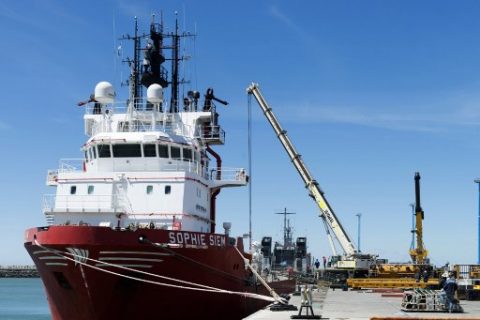
by Liliana Samuel, Carlos Reyes and Eitan Abramovich
Agence France Presse
MAR DEL PLATA, Argentina (AFP) — Argentina’s navy confirmed Thursday that an unusual noise heard in the ocean near the last known position of a submarine appeared to be an explosion, dashing the last hopes of finding the vessel and its 44 crewmembers.
Concern for the missing submarine and its crew has gripped Argentina since it was reported overdue at its Mar del Plata base on November 17, two days after the explosion.
“An anomalous, singular, short, violent and non-nuclear event consistent with an explosion,” occurred shortly after the submarine’s last communication, navy spokesman Captain Enrique Baldi told a news conference in Buenos Aires.
Relatives of the missing crew reacted with grief and anger to the news.
After days of false hopes, some of the relatives said the navy had retained information about the sub, and had lied to them over the past week.
“I feel cheated,” said Itati Leguizamon, whose husband German Suarez was a sonar operator on the San Juan.
“They are perverse. They are miserable,” she said.
“They did not tell us they died. But they tell us they are three thousand meters (9,800 feet) deep,” added Leguizamon as other family members shouted angrily around her.
“People are becoming very aggressive. They lied to us,” said Leguizamon, a lawyer.
Underwater sounds detected in the first days of the search by two Argentine search ships were determined to originate from a sea creature, not the vessel. Satellite signals were also determined to be false alarms.
Russia was the latest navy to volunteer to a multinational sea search, sending an oceanographic research ship as the operation shifted focus from rescue to recovery.
The Russian defense ministry said the Yantar was steaming to the area from the western coast of Africa on the orders of President Vladimir Putin.
The weeklong search has focused on the sub’s last known position, around 200 miles (320 kilometers) off the Argentine coast, but has been hampered by bad weather.
The San Juan, a 34-year-old German-built diesel-electric submarine, had reported a battery problem on November 15 and said it was diverting to its home base at Mar del Plata, but did not send a distress signal, according to the navy.
Baldi had admitted on Wednesday that the situation for the sub and its crew appeared to be worsening.
However, he refused to speculate at that point on the origin of what he initially described as a “hydro-acoustic anomaly,” detected in the ocean almost three hours after the sub’s communication and 30 miles north of its last known position.
Baldi explained that information about the unusual noise only became available Wednesday after being relayed by the United States, and “after all the information from all agencies reporting such hydro-acoustic events was reviewed.”
Hydro-acoustic stations operated by the Comprehensive Nuclear Test-Ban Treaty Organization had picked up the noise of the explosion on November 15 at 1352 GMT, he said.
Explaining the lack of debris on the surface, Baldi said “nothing will end up floating to the surface” because a submarine “implodes.”
Gustavo Mauvecin, director of the Center for Hyperbaric Medicine at Mar del Plata, said “the issue of hydrogen is always an issue with submarines with electric engines.”
The San Juan “has 500 tons of lead-acid batteries, which release hydrogen if there is an overcharge in the battery, hydrogen in contact with oxygen is explosive.”
A former submarine commander told AFP a problem with batteries, as the sub had reported, could cause an explosion.
“A severe problem with batteries might generate hydrogen. Hydrogen above a certain percentage is explosive,” said the commander, who requested anonymity.
“It explodes by itself. Should they have had an explosion, then what? Everything was lost.”
The ARA San Juan would have had enough oxygen for its crew to survive underwater in the South Atlantic for seven days since its last contact, according to officials. That time had elapsed by 0730 GMT Wednesday.
Putin phone call
Argentina is leading an air-and-sea search with help from several countries now including Brazil, Britain, Chile, Colombia, France, Germany, Peru, Russia, the United States and Uruguay.
Putin offered “words of support over the situation with the San Juan submarine,” in a phone call to Argentine President Mauricio Macri late Wednesday, the Kremlin said.
US President Donald Trump offered his support, tweeting: “May God be with them and the people of Argentina!”
Russia said the Yantar “is equipped with two deep water submersibles which allow exploratory searches at a depth of up to 6,000 meters.”
The conditions had fueled hopes that the vessel may have been on the surface undetected.
Despite mechanical problems, the crew could survive indefinitely if the sub retained the ability to rise to the surface to “snort” or replenish its air.
© Agence France-Presse







